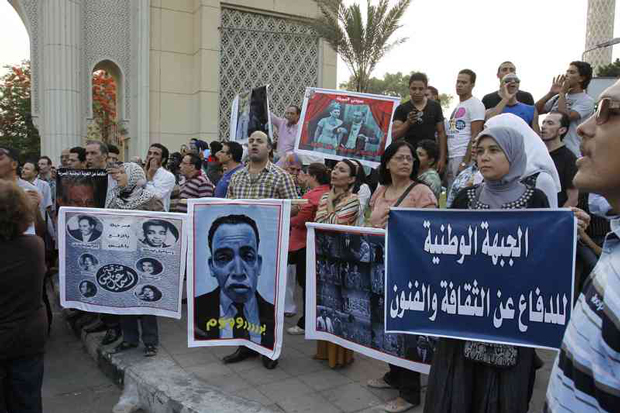Belarus’s cat and mouse diplomacy on human rights
 Lukashenko’s government is open for dialogue with Europe. But it will expect something in return, says Andrei Aliaksandrau
Lukashenko’s government is open for dialogue with Europe. But it will expect something in return, says Andrei Aliaksandrau
(more…)
 Lukashenko’s government is open for dialogue with Europe. But it will expect something in return, says Andrei Aliaksandrau
Lukashenko’s government is open for dialogue with Europe. But it will expect something in return, says Andrei Aliaksandrau
(more…)
AUSTRALIA
Jetsetter: Australia, censorship, and the banning of ‘Saints Row IV’
Great artists will tell you on the regular that the key to making great art is to make it for yourself first, but that’s not always a realistic end point for people creating art for a living especially when you’ve got to think about the audience. Do you make something for everyone globally, or do you make something for a small group? How do you actually make something that speaks to everyone?
(Digital Trends)
BAHRAIN
Bahrain Student Sentenced for Insulting King
The Bahrain Centre for Human Rights (BCHR) on Saturday said Ali Al Shofa was arrested in a house raid at dawn on 12 March 2013. He spent two months in jail while under investigation, Aljazeera reported.
(FARS)
CAMBODIA
Cambodia drops ban on foreign-produced radio shows
Cambodia on Sunday reversed a ban on local radio stations airing foreign-produced broadcasts in the run-up to next month’s general election, following US criticism of the move as an attack on freedom of expression.
(Bangkok Post)
GHANA
Is Supreme Curtailing Freedom of Expression?
In the wake of the Supreme Court hauling the Deputy Communication Director of NPP before it on Wednesday June 26, 2013 to explain his accusation of the Justices being selective and hypocritical in singling out the Daily Guide and the subsequent invitation to three others to appear before it on July 2, 2013, a number of articles have appeared on Ghanaweb not only attacking the actions and decisions but also the Presiding Justice as well as accusing him or the Justices of threatening freedom of expression and press freedom.
(Ghana Web)
JAMAICA
Gays, Muslims And Free Speech
In October 2001, Evangelical preacher Harry John Hammond held up a large placard in Britain which read, ‘Stop immorality, stop homosexuality, stop lesbianism’. A group of approximately 40 people gathered around him, some threw missiles, and one attempted to pull away his placard. He fell backwards but got back up and resumed preaching against homosexuality.
(The Gleaner)
MIDDLE EAST
Some Arab gov’ts accused of spying on web users
Internet users in several Arab states have claimed governments are spying on their online activities and at times sending threats in an attempt to avoid Arab Spring-style uprisings.
(Arabian Business)
SOUTH AFRICA
SA’s ‘NObama’ Protests – Broad but Confused
After weeks of planning, US President Barack Obama arrived at the Waterkloof airbase on Friday evening. But not everyone wants him here, and the protests against his visit have drawn support from across the political spectrum.
(All Africa)
TURKEY
A Guide To Everything Google Has Been Asked To Censor
The internet is all about the free flow of ideas, right? Collaboration! Discourse! Sharing! The day to day reality of what we do online may not always be quite so idealistic and ideologically motivated, but the open underpinnings are there. Except, of course, when they’re not at all. This visualisation, published by Sebastian Sadowski, uses Google’s transparency data to visualise all the things the company has been asked to censor.
(Gizmodo)
UNITED KINGDOM
Hate porn, sure, but be wary of banning it
The principle that consenting adults are free to watch what they want is worth defending
(The Guardian)
UNITED STATES
A Mellower ‘Mr. Negative,’ but Still Passionate About Free Expression
On a July 2 about 10 years ago, Norman Siegel had a constitutional crisis all his own. In Barcelona on vacation, he realized that he had left his copy of the United States Constitution back home in New York. This was terrible.
(The New York Times)
Pence deletes Facebook comments, accused of censorship
A social media war over the U.S. Supreme Court’s rulings on gay marriage this week showed Gov. Mike Pence is still learning that being the state’s top executive often means dealing with surprises — a sharp contrast from the role he previously played in Congress, where 435 lawmakers frequently respond to specific problems.
(The Daily)
Changes required for Kan. abortion provider websites central to free-speech dispute
Anti-abortion leaders who helped push now-challenged restrictions through the Kansas Legislature this session say they’re taken aback by an attack on new rules for providers’ websites.
(AP via The Republic)
Atheists unveil Fla monument near Ten Commandments
A group of atheists unveiled a monument to their nonbelief in God on Saturday to sit alongside a granite slab that lists the Ten Commandments in front of the Bradford County courthouse.
(Times-Standard)
Newspapers must defend free speech
Many moons ago, when I worked at another newspaper in another community, I got into some hot water for approving a letter to the editor that ticked off an advertiser. I do not believe the letter was libelous, but it certainly irritated someone with deep pockets.
(Mansfield News Journal)
Previous Free Expression in the News posts
June 28 | June 27 | June 26 | June 25 | June 24 | June 21 | June 20 | June 19 | June 18 | June 17

Egyptian intellectuals hold posters and the Tamarod (Rebellion) petitions while chanting slogans during a demonstration against the Minister of Culture Alaa Abdel Aziz, in front of the opera house in Cairo. (Photo: Mohamed Elmaymony / Demotix)
Tensions have been building up in Egypt ahead of mass protests called for by opposition activists on 30 June, the date marking the first anniversary of Islamist President Mohamed Morsi’s inauguration. Shahira Amin reports on the growing concerns for free expression
A sit in by a group of Egyptian filmmakers, writers, performers and intellectuals — which has continued for the past two weeks outside Cairo’s Ministry of Culture — is seen as a prelude to the bigger anti-Muslim Brotherhood protests planned for Sunday. The mass demonstrations are being called for by “Tamarod” (Rebellious), a nationwide campaign launched by members of the opposition Kefaya to collect signatures from Egyptians for a vote of no confidence in the Islamist President. Organizers of the campaign recently announced that they have succeeded in gathering 15 million signatures.
Meanwhile, the arts protesters outside the ministry are demanding the removal of Egypt’s new Islamist minister of culture Alaa Abdel Aziz and protesting what they claim are efforts by the Islamist government to “Ikhwanize” the arts. Ikhwanize is an Arabic word which literally means the appointment of members of the Muslim Brotherhood in key positions in state institutions.
The protesters have been using peaceful means to hammer home their message including poetry recitals, performances and raising placards with anti-Muslim Brotherhood slogans.
Skirmishes broke out briefly last week after the peaceful rally was attacked by Islamist supporters of President Morsi who chanted pro-Muslim Brotherhood slogans and demanded that the minister purge the ministry of old regime remnants. Several protesters were injured in rock throwing incidents and assaults by the Islamist demonstrators before riot police intervened.
The protesters began their sit in after Abdel Aziz dismissed several cultural figures including the directors of the General Egyptian Book Organization, the Cairo Opera House and the National Library and Archives. These firings fueled fears that the expulsions were a first step to stifling artistic expression in the country by placing conservative Islamists at the helm of these institutions.
In a press statement released earlier this month, the Abdel Aziz defended the dismissals as a “campaign against corruption” which he said was a necessary step to purge the ministry of corrupt elements and halt embezzlement of public funds by greedy individuals. The cast of Opera Aida retaliated by appearing on stage with anti-Muslim Bortherhood placards and chants calling for the downfall of the Morsi regime.
Today on Index
Lords criticise Stormont delay on libel reform | Turkey must end attempts to limit free speech | Free speech roundup: Bahrain edition | Free expression in the news
The sackings followed controversial statements made earlier this month by conservative Salafist MP Gamal Hamed who criticized ballet as the “art of nudity” during a televised parliamentary session. His statements sparked concerns that ballet performances may be banned under the Islamist government. In recent months, some ultra-conservative Salafis have condemned the display of statues, insisting that depiction of the human body in paintings or sculpture is “frowned upon in Islam.” Such statements have stirred controversy, triggering an outcry by Egyptian liberals and intellectuals who are growing increasingly concerned that the rising wave of conservatism sweeping the country threatens the thousands of statues in museums and historic temples.
“Such statements pose a very real threat tp our ancient heritage as they may incite violent attacks by Islamist zealots on our monuments, “ said Maged Farrag, a liberal collector of royal artifacts.
In a move hailed as a victory by Egypt’s liberals and intellectuals, Mahmoud Abdulla, a controversial Salafi TV preacher who insulted Egyptian actress Elham Shaheen on his TV show on the religious Satellite Channel El Nas, has recently been sentenced to three years in prison and ordered to pay a fine. He had said that Shaheen would “never see the gates of Heaven because of her indecent roles on screen”. He stands to be imprisoned after his appeal was rejected by a court earlier this month.
Egypt’s liberals and intellectuals, however, are becoming increasingly concerned about what they describe as persistent attacks on creativity and artistic expression under Islamist rule. Many of them fear that the Islamist government is determined to alter Egypt’s cultural identity. In a column published earlier this month by state-sponsored Al Ahram, Khaled Fahmy, chairman of the history department at the American University in Cairo, explained that attempts by the Muslim Brotherhood to exercise control over the arts and culture were based on their conviction that Egypt’s identity “had been hijacked by the West and that the time had come for the country to regain its Islamic identity.”
The ministry of culture protesters have turned down an invitation for dialogue extended by President Morsi, who has promised to listen to their demands and concerns. They have vowed not to budge until Abdel Aziz is replaced.
“Egypt is not a privately-owned farm to be divided among the President’s loyalists as reward for their allegiance”, the Freedom of Creativity Front, a coalition of artists supporting the sit-in, said in a statement released earlier this month.
With just days to go before the mass protests demanding the downfall of the President and the Muslim Brotherhood group from which he hails, more opposition activists are joining the ministry of culture sit in on a daily basis.
It appears certain that the ministry building will be one front where the secular-Islamist battle will be fought out.
Peers have debated Northern Ireland’s rejection of the Defamation Act 2013. Padraig Reidy reports

Will free speech be chilled at Stormont? (Pic: Johnny McGinley/Demotix)